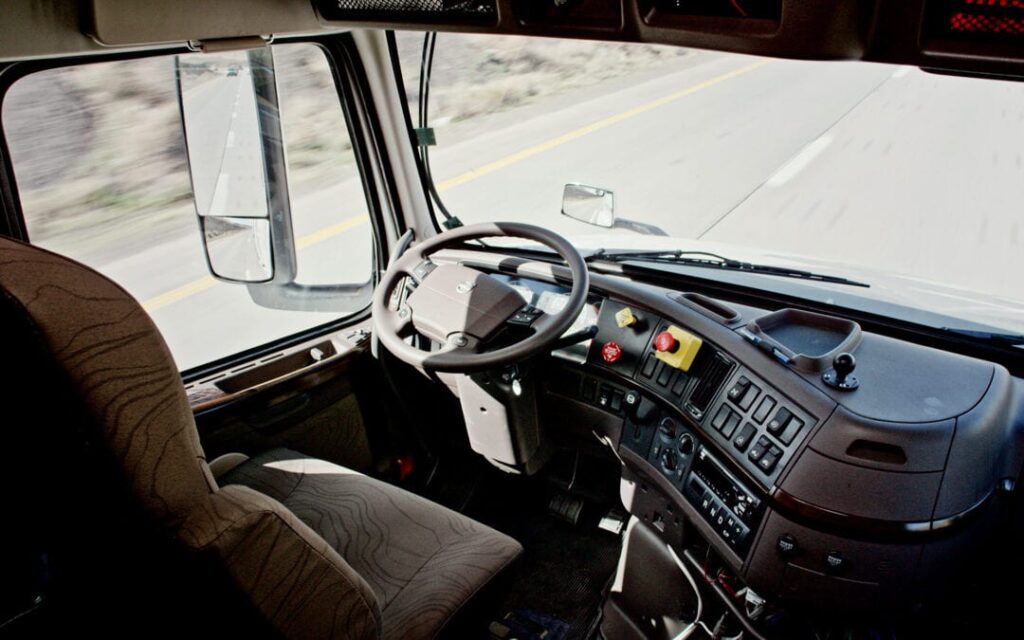As the buzz around driver-less (autonomous) trucks increases, some who are debating a career in truck driving question the future of the industry. At SAGE Truck Driving School, we are seeing an increased demand for new drivers, but decided to do some research on just how close we are to seeing these vehicles on the road.
A report by the American Center for Mobility, projects that significant numbers of automated vehicles will not be deployed until near 2030. When that happens, we might see a drop in car driving jobs like taxi cabs, but for truck driving jobs that is hardly the case. Studies indicate there is still so much to be figured out. The Insurance Institute for Highway Safety shows the readiness for such vehicles to adequately handle the challenge of taking over all driver functions is still very much in doubt. According to experts, there is just no substitute for human drivers in situations like negotiating hills and curves, adapting to weather conditions, etc.
Aside from concerns about ability, safety and readiness, there are major legal concerns to think about. Consider this: There is no legal path to suing a self-driving truck that hits and kills someone. What happens when there is no driver to sue? Based on current liability laws, the freight company who made the truck cannot be sued. Even if those liability laws were changed, that would mean the maker of the self-driving software, the equipment manufacturers, and everyone else involved in the truck’s machinery could be sued. Clearly, this is going to meet some harsh push back and will likely be fought out in courts for years.
Suffice to say trucking experts are certain that driver-less technology isn’t going to put America’s 1.8 million truckers out of work anytime soon. The technology isn’t fully developed yet, and the law is far from catching up to it. The fact is, the current driver shortage still fuels the demand for truck drivers and will continue to for many foreseeable years ahead. Just because the technology is getting closer, doesn’t mean it makes sense to implement it. Remember, over 55 years ago The Jetsons aired on TV and convinced most of us we’d be flying ourselves to work by now. The technology might be here, but applying it may prove to be impractical at best.
What are the current legal barriers to deploying autonomous trucks, and how might they change in the future?
The current legal framework isn’t equipped to handle the unique challenges posed by autonomous vehicles, particularly around liability and accountability in the event of accidents. For autonomous trucks, one major barrier is the absence of a legal precedent for who is at fault in accidents involving driverless vehicles: is it the manufacturer, the software developer, the owner, or some combination thereof? Future legal changes may include new regulations that clearly define liability in such scenarios, possibly by creating a new category of vehicle insurance or by mandating that manufacturers and software developers assume a greater portion of the liability. This would require comprehensive legislative action and consensus among lawmakers, industry stakeholders, and the public.
How is the trucking industry currently responding to the potential shift towards autonomous trucks in terms of investment and research?
The trucking industry’s response includes cautious optimism and significant investment in research and development. Major automotive and tech companies are investing billions into developing autonomous driving technology, partnering with traditional truck manufacturers, and conducting extensive road tests. Additionally, industry stakeholders are closely monitoring legislative developments and participating in discussions to shape the future regulatory landscape. However, the pace of adoption is tempered by the technological, legal, and ethical challenges outlined. Industry-wide, there’s an acknowledgment that while autonomous trucks will eventually play a role in logistics and freight, the transition will be gradual and require significant advancements in technology, infrastructure, and regulatory frameworks.
What impact will autonomous trucks have on the cost of goods transportation and the overall economy?
The introduction of autonomous trucks is expected to significantly reduce the cost of goods transportation over the long term, primarily through savings on labor costs, increased efficiency, and reduced accidents and insurance premiums. These trucks can potentially operate nearly 24/7, reducing delivery times and improving logistics efficiency. However, the initial impact on the economy could be mixed. While consumers and companies might benefit from lower transportation costs and potentially lower prices for goods, there could be significant disruptions in employment for traditional truck drivers, affecting millions of jobs. Economic models suggest that while some jobs will be lost in the transition, new jobs will be created in technology development, fleet management, and maintenance of autonomous systems. The net economic impact will depend on how quickly the technology advances, how effectively the workforce can be retrained for new roles, and how regulations are adapted to support this transition.
Disclaimer: The information in this article is based on the data available as of its writing and is meant to inform and guide prospective CDL trainees. For the most current information and specifics about CDL training programs, please contact SAGE Truck Driving Schools directly.

